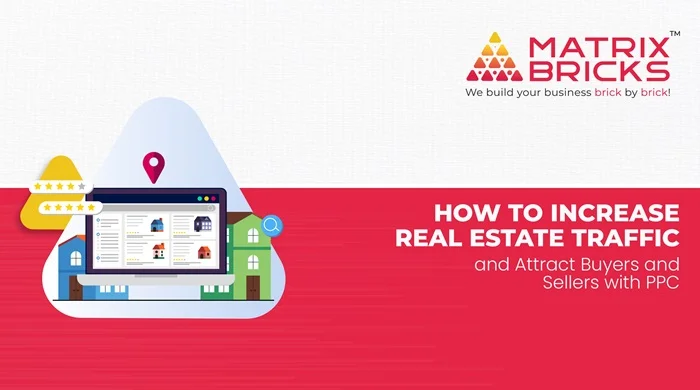
In the competitive world of real estate, generating traffic and attracting potential buyers and sellers can be daunting tasks. However, with the right strategies, you can effectively drive traffic to your website and convert visitors into leads. One of the most powerful tools in your digital marketing arsenal is pay-per-Click (PPC) advertising. This blog will guide you through the steps to increase real estate traffic and attract buyers and sellers using PPC.

Understanding PPC Advertising
A pay-per-click advertisement involves advertisers paying a fee each time their ad is clicked. Essentially, it’s a way of buying visits to your site rather than attempting to earn those visits organically. Google Ads is one of the most popular PPC platforms, but others like Bing Ads and social media platforms like Facebook and Instagram also offer robust PPC advertising options.
Why PPC is Effective for Real Estate
- 1. Immediate Results: Unlike SEO, which can take months to start seeing results, PPC campaigns can begin driving traffic almost immediately.
- 2. Targeted Advertising: PPC allows you to target specific demographics, locations, and even times of the day, ensuring your ads reach the right audience.
- 3. Measurable ROI: With PPC, you can track every penny spent and understand exactly what your return on investment (ROI) is.
- 4. Control Over Budget: You set the budget and can adjust it based on performance, making PPC a flexible option for businesses of all sizes.
Setting up a PPC Campaign for Real Estate
- 1. Define your Goals
Before launching a PPC campaign, it’s crucial to define your goals. Are you looking to generate leads, increase website traffic, or promote a specific property? Structure your campaign effectively by setting clear goals. - 2. Conduct Keyword Research
The foundation of any successful PPC campaign is keyword research. Use tools like Google Keyword Planner, SEMrush, or Ahrefs to identify relevant keywords that potential buyers and sellers are searching for. Focus on long-tail keywords such as “buy house in [city]” or “sell my home fast in [city]” as they often have lower competition and higher conversion rates. - 3. Create Compelling Ad Copy
Your ad copy should be compelling and address the needs of your target audience. Highlight unique selling points, such as free consultations, local expertise, or special promotions. Include a strong call-to-action (CTA) like “Schedule a Viewing” or “Get a Free Home Valuation”. - 4. Design Landing Pages
The landing page is where potential clients will land after clicking your ad. Ensure it is optimized for conversions by including a clear headline, concise information, and a strong CTA. The page should load quickly and be mobile-friendly, as a significant portion of traffic will likely come from mobile devices. - 5. Set up Conversion Tracking
To measure the effectiveness of your PPC campaign, set up conversion tracking. This will allow you to see which ads are driving leads and which ones need adjustment. Google Ads offers conversion tracking tools that can be easily integrated into your campaign.
Optimizing Your PPC Campaign
- 1. Use Ad Extensions
Ad extensions provide additional information about your business and can improve your ad’s visibility and click-through rate (CTR). Use extensions like location, call, and site link extensions to provide more value to potential clients. - 2. A/B Testing
Continuously test different versions of your ads to see which ones perform better. Experiment with various headlines, ad copy, and CTAs. A/B testing helps you refine your ads and improve their effectiveness over time. - 3. Monitor and Adjust Bids
Regularly monitor your bids and adjust them according to their performance. For high-performing keywords, increase your bids, and for low-performing keywords, decrease your bids. This ensures you’re getting the most out of your budget. - 4. Negative Keywords
A negative keyword is a term you don’t want your ads to appear for. Adding negative keywords helps you avoid irrelevant traffic and ensures your ads are shown to a more targeted audience. For instance, if you’re targeting luxury home buyers, you might want to exclude keywords like “cheap homes” or “budget apartments”.

Leveraging PPC for Buyer and Seller Leads
For Buyers
- 1. Property Listings: Create ads for specific property listings to attract buyers looking for homes in particular areas. Use high-quality images and detailed descriptions to make your ads stand out.
- 2. Local Market Information: Share ads that provide valuable information about the local real estate market, such as market trends, price changes, and new listings. This positions you as a knowledgeable resource and attracts serious buyers.
- 3. Virtual Tours and Open Houses: Promote virtual tours and open house events through your ads. This gives potential buyers an opportunity to explore properties online before committing to an in-person visit.
For Sellers
- 1. Home Valuation: Offer free home valuation services through your ads. Many homeowners are curious about their property’s value, and providing a free valuation can generate valuable seller leads.
- 2. Seller Guides: Create and promote guides that help homeowners understand the selling process, prepare their homes for sale, and maximize their property’s value. This builds trust and positions you as an expert in the field.
- 3. Success Stories: Share testimonials and success stories from past clients who have successfully sold their homes through your services. Social proof is a powerful motivator for potential sellers.
Measuring Success
Key Metrics to Track:
- 1. Click-Through Rate (CTR): The ratio of users who click on your ad to the number of total users who view it. Having a higher CTR indicates your ad is compelling and relevant.
- 2. Conversion Rate: Percentage of users who complete a desired action, such as completing a contact form or scheduling a consultation. This metric shows how effective your landing page and overall campaign are.
- 3. Cost Per Click (CPC): The average amount you pay for each click on your ad. Monitoring CPC helps you manage your budget effectively.
- 4. Cost Per Conversion: The average cost to acquire a lead or customer. This metric is crucial for understanding your campaign’s ROI.
Analyzing and Adjusting
Regularly analyze your campaign’s performance data and make adjustments as needed. Identify patterns in the data to understand what’s working and what’s not. For instance, if you notice certain keywords have a high CTR but a low conversion rate, you might need to tweak your landing page or ad copy.
Conclusion
PPC advertising is a powerful tool for increasing real estate traffic and attracting buyers and sellers. By defining clear goals, conducting thorough keyword research, creating compelling ads, and continuously optimizing your campaign, you can drive targeted traffic to your website and generate valuable leads. Remember to regularly measure your campaign’s success and adjust your strategies to ensure maximum ROI. With the right approach, PPC can be a game-changer for your real estate business, helping you stand out in a crowded market and achieve your sales goals.





